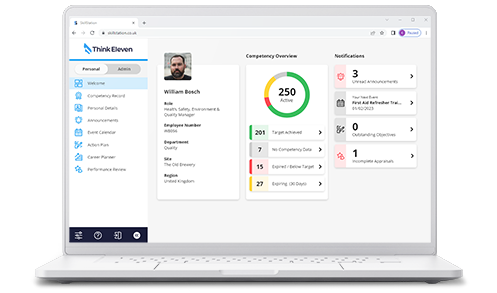What training records should you keep? How should you store them and how long should you hold them for? We aim to answer these question in todays article.
Robust and accurate training records will enable your organisation to operate effectively. The key data in these records assists with strategic operational decisions, for example workforce planning. Training records are also a crucial legal obligation in many cases.
These records are going to be largely dependent of the nature of your organisation and the way they are kept, i.e., paper records, logbooks, or digital records.
Training records are important
Comprehensive and up-to-date training records are vital to the smooth running of an organisation. The importance of these documents being accurate and well-managed can be easily underestimated, especially if your organisation is subject to regulatory requirements or audits. Furthermore, some customers or awarding bodies may audit your organisation’s records before engaging or accrediting.
Records of training, skills and capability can be / should be influential when making important organisational strategic decisions. The correctness and detail of these records will be the difference between a decision taken from a position of informed confidence, as opposed to guesswork / gut feeling.
How to maintain training records
Organisations that have held records for long periods tend to use an existing paper-based storage system. Modern technology has made the shortcomings of this method become glaringly apparent:
- Large amount of physical storage space required
- Time consuming admin burden to keep documents maintained
- Prone to errors that are difficult to detect
- Risk of physical data loss, for example a building fire or flooding
- Very difficult to make the information reportable
Some organisations that store records digitally rely on excel spreadsheets. Whilst this is an improvement over paper-based record storage, it has its own set of disadvantages:
- Spreadsheets can be duplicated, leading to confusion on which it the correct, most up-to-date version
- Spreadsheets make it difficult to achieve standardisation
- Difficulty on tracking multiple training events through time
- Varying levels of ability with Excel making amending spreadsheets difficult and problematic
Digitising training records is a step in the right direction, but spreadsheets don’t solve all of the problems, nor do they give us the full advantage of making the data fully reportable.
A dedicated skills, training, and competency management system, such as SkillStation, is the solution:
- Reporting and analytics of skills and training data
- Training and validity periods can be configured so the system can provide expiry and retraining notifications
- Make the process of accurate record keeping easier and more accessible
- Certification can be uploaded to be securely and safely stored
- Additional data can be easily captured such as, training cost, location, provider and duration.
- Removes the risk of multiple versioning
- Perfect solution for complying with audits
As we can see from the benefits above, a competency management system will allow us to not only fulfil the minimum needs and requires of keeping training records but will also allow us to start leveraging that data in useful ways. As the system is designed for managing training and competency, unlike excel, value is added with the extra functionality and reduced administrative burden.
How long should records be kept?
An organisation will collect training and competency records of all current employees – but what if the employee leaves the company? Should the organisation hold onto these records? If so, how long should they keep them?
Its advantageous, and in sometimes legally required, to keep records of former employees in a well-organised system so that they can be referred to if required. For example, the employee may return to the organisation, or for legal protection to demonstrate historically that employees were correctly trained and competent.
Records containing personal data such as training, skills, and competency records, are subject to data protection laws. Some records will be required legally to be held for a statutory period – for example, First Aid Training has a statutory retention period of 6 years after employment. The period for other records may vary by sector or responsibility.
CIPD have a useful factsheet that covers the legalities of this process in detail.
Need help? Then reach out!
We hope this has shed some light on the importance of training records and how best to store them. If you have any questions on this subject or any other on the Think Eleven blog, contact us and we’ll be happy to help!


